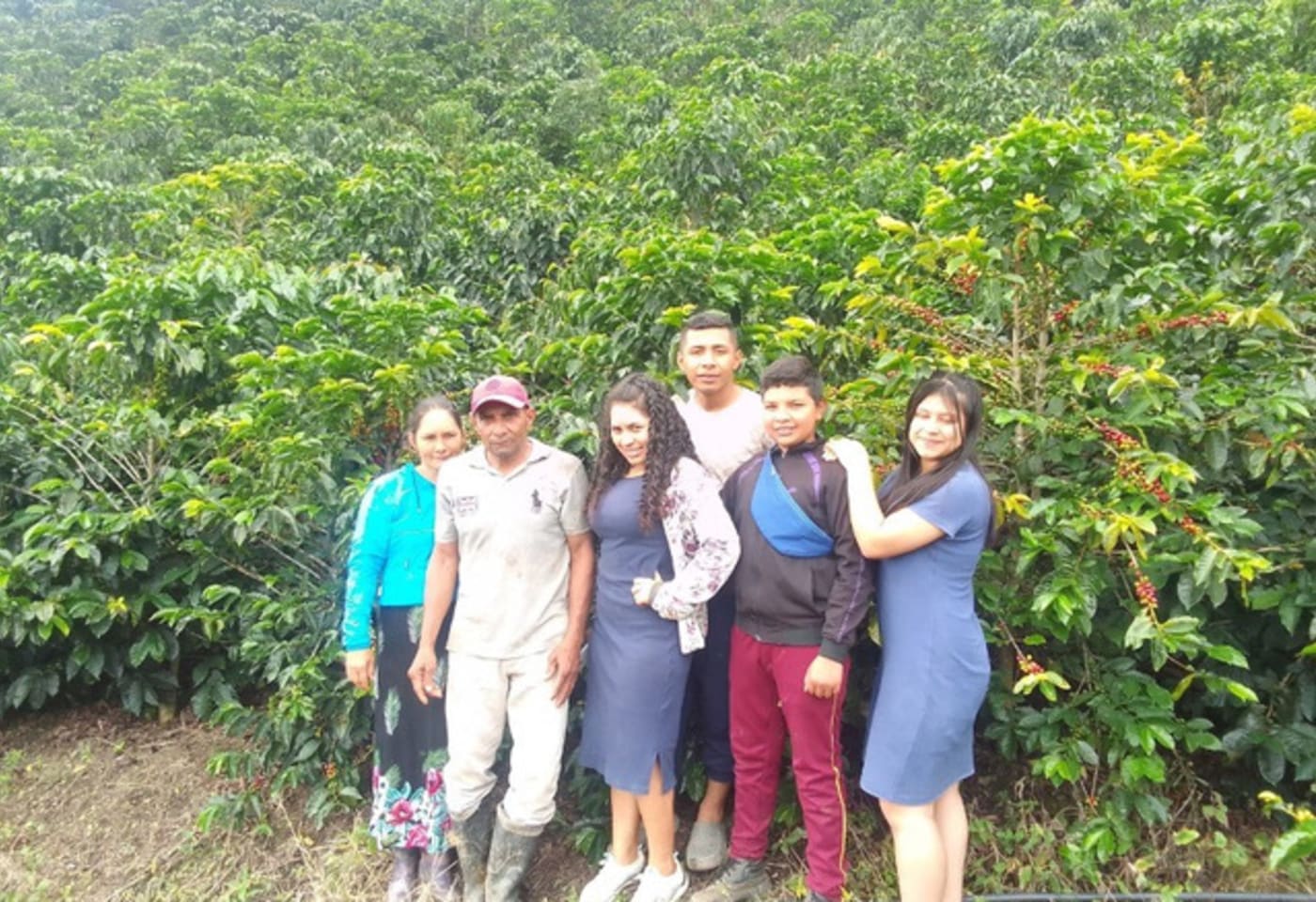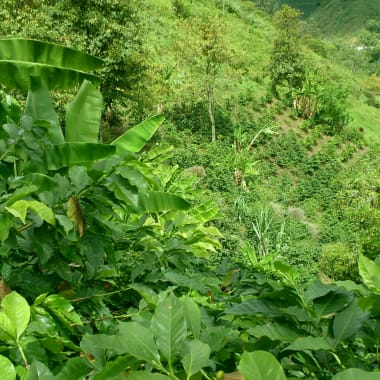-
Producer
-
Edgar Sosa Garcia
-
Country
- Colombia
-
Region
-
Tolima
-
Altitude
-
1650m above sea level
-
Variety
-
Process
-
Body
-
-
Acidity
-
-
Tasting notes
-
Watermelon, baked apple, rose hip
-
Roast style
Colombia
Edgar Sosa Garcia
This washed Caturra comes from a family business with whom we share values—'strive for better’ and ‘pursue consistency’. We taste watermelon, baked apple, and rose hip
This gently washed Caturra comes from a family business with whom we share values—'strive for better’ and ‘pursue consistency’.
Anzoategui is a small town in the Tolima department of Colombia. In the surroundings, climbing up the skirts of the Cordillera Central, Edgar Sosa and Flor Alba Rojas run their coffee farm called Mesopotamia.
Edgar and Flor (now husband and wife) met while working as coffee pickers back in 1997 when he moved to this region looking for employment. A few years later, he landed a job as a specialty coffee farm administrator, where he learned a lot about processing and drying high-quality coffee—they sometimes even sent some to contests like Cup of Excellence. Eventually, the couple bought some land and began putting their skill to practice for producing their own coffee.
Today, the duo runs Mesopotamia with the help of their eldest son, who shows a heap of interest in the world of coffee. From the beginning, their focus has been on producing specialty grade because they know it brings more stability and better incomes than commodity.

Their driving principles are ‘strive for better’ and ‘pursue consistency’. This approach has proved very successful, as the volumes and quality of the previous years have been increasingly good, future-proofing their business from the ups and downs in the coffee market.
*
This lot features the Caturra varietal, processed using a traditional washed method.
The cherries, picked at the perfect point of ripeness, are placed inside plastic bags for a fermentation period of 1-2 days. Then, these are pulped and fermented again in covered tanks for 20-36 hours. Finally, the coffee is washed with water and dried in drying beds for about 5 days if it’s sunny, of up to 20 days if it’s cloudy and rainy.
All images and information about this coffee and its producer(s) have been kindly shared with us by the importer, Caravela, and edited by us, Sample Coffee (unless linked to or credited otherwise).
Our ‘sweet spot’ for opening each coffee bag and brewing its contents is during days ~15-35 post-roast date.
Learn more about our updated coffee aging recommendations.
Need any brewing tips?
Head to our brew guides and find your favourite filter method—or head straight to our single origin espresso recipe. If you have further questions, send us an email. We’re always keen to help.
Learn everything about this coffee:
Ethical, traceable sourcing
This page has all the sourcing information (variety, process, region, story, importer, and more) that our importers share with us, and give us permission to use.
The transparency helps us talk confidently about the quality and background of our product, and it helps you know exactly what you’re buying.
Learn more:
Coffee page transparency legend
Our coffee philosophy
Our business approach
Fresh harvest coffee
We only source and roast coffee from each country’s latest harvest season (so the green coffee is never older than 1 year from the time of picking, processing and packing). This ensures the sensory qualities are always at their peak and unaffected by excessive ageing.
Roasted for espresso and filter (best enjoyed black)
Roast style: omni. Omni roasts are designed to brew and taste great both as espresso and filter. Our omni single origins generally sit on Agtron values in the ~70-60 value range. So, technically, they are somewhere in the lighter side of the medium spectrum.
Designed for espresso and filter brewing. Best enjoyed black.
Learn more:
Our Loring Kestrel S35 roaster
Our roasting style and approach
Best brewed within days 15-49 post-roast
The ‘fresh is best’ saying doesn’t apply to coffee (contrary to popular belief). Waiting before opening and brewing your bag of whole coffee beans helps develop peak flavour and acidity.
But heads up: if you buy pre-ground coffee, brew it as soon as possible.
Learn more:
Our recommended brewing window
Try our custom brewing recipes
Our recipes and ratios are tailored to our coffee sourcing and roasting styles, bringing the best flavour and feel out of each coffee.
For pour over, immersion, and other filter brewing styles, check our brew guides.
For our espresso single origins, we recommend a coffee:yield ratio of 1:3:
- Dose: 20g ground coffee
- Yield: 60g espresso
- Total brew time: ~24-28 seconds
This is just a starting point! We encourage you to experiment, taste, and adjust to find the recipe that you enjoy the most.
Learn more:
Our espresso brew guide (single origin)
Brewing ratio calculator
Packaging and sustainability
- Bags: ABA-certified home compostable (AS 5810-2010)
- Labels: recyclable
- Valves (only on +250g bags): general waste
- Box and tape (online orders): recyclable
Learn more:
Our packaging
Variety
Caturra variety
Caturra is a natural mutation of Bourbon that was originally discovered in Brazil in 1937, considered to be the first naturally occurring mutation ever discovered.
The location
Coffee from Colombia
Colombia is one of the largest coffee producers in the world and benefits greatly from having one of the most unique and complex set of micro-climates of all coffee producing nations.
Farm processes
Washed process
Machines are used to remove the flesh from the coffee cherry before being fermented in water, washed again, and finally sun dried. This process tends to result in more distinct, cleaner flavours.

Subscribe to a world of coffee
Discover a new single origin coffee from Sample every 1-5 weeks with no delivery fees.
No up-front purchase, and you can pause, cancel, or change plans at any time.
Available to order online this week:

Mexico Isavel Lopez Pablo
Flavours of sugarcane, dried cranberry, white peach
Body Acidity
Washed Typica
April 2025 harvest
Roasted omni for filter and espresso
Mexico Isavel Lopez Pablo online
Kenya Karimikui
Flavours of blood orange, blackberry, plum jam
Body Acidity
Washed Batian, SL28, SL34, Ruiru 11
November 2024 harvest
Roasted omni for filter and espresso
Kenya Karimikui online
Ethiopia Tadese Teko
Flavours of bergamot, mandarin, mango
Body Acidity
Washed Ethiopian Heirloom
January 2025 harvest
Roasted omni for filter and espresso
Ethiopia Tadese Teko online
Peru Miguel Estela
Flavours of honeydew melon, white grape, marmalade
Body Acidity
Washed Marshell
August 2025 harvest
Roasted omni for filter and espresso
Peru Miguel Estela online